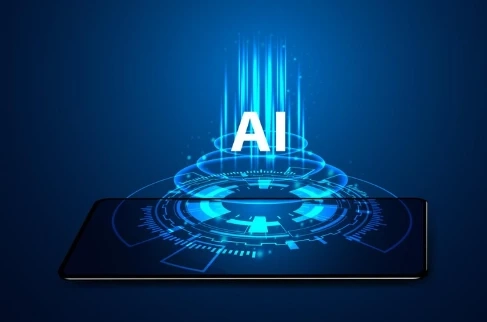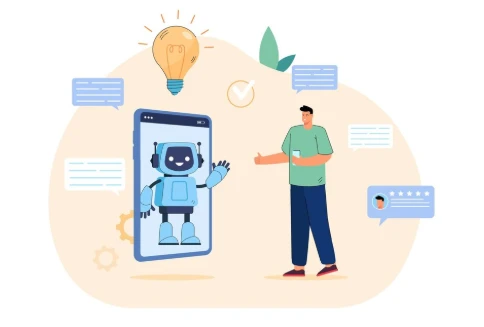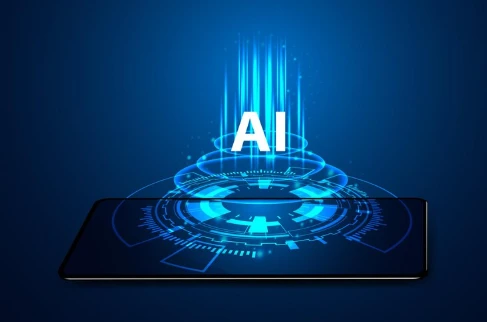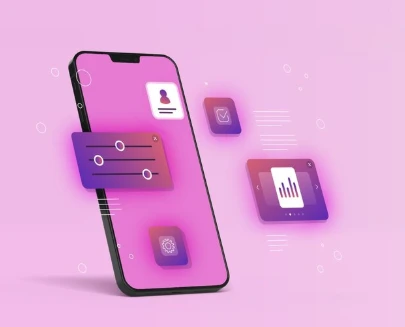The future of AI in mobile apps is unfolding before our eyes, transforming how we interact with technology and revolutionizing entire industries. As artificial intelligence becomes increasingly sophisticated, intelligent mobile apps 2025 are emerging as the dominant force in mobile technology, offering unprecedented personalization, automation, and user experiences that adapt in real-time to individual preferences and behaviors.
The global AI mobile app market is projected to reach $421.4 billion by 2030, with a compound annual growth rate of 28.7% from 2023 to 2030. This explosive growth reflects the fundamental shift toward intelligent applications that don't just respond to user commands but anticipate needs, learn from interactions, and continuously evolve to provide more value.
The Rise of Intelligent Mobile Applications
Transforming User Expectations and Experiences
Modern mobile users expect applications that understand context, predict needs, and deliver personalized experiences without explicit instructions. AI-powered mobile app solutions are meeting these expectations by incorporating machine learning algorithms that analyze user behavior patterns, preferences, and environmental factors to create truly adaptive interfaces.
These intelligent applications go beyond traditional reactive programming models. They proactively suggest actions, automate routine tasks, and provide insights that help users make better decisions. From smart calendars that automatically schedule meetings based on availability patterns to fitness apps that adjust workout recommendations based on biometric data and weather conditions, AI is creating more intuitive and valuable user experiences.
The Competitive Advantage of AI Integration
Companies that build AI-powered mobile application solutions gain significant competitive advantages in today's market. These applications demonstrate higher user engagement rates, improved retention metrics, and increased customer lifetime value compared to conventional mobile apps.
Research indicates that AI-powered apps experience 37% higher user retention rates and generate 42% more revenue per user than traditional applications. This performance differential stems from AI's ability to create personalized experiences that evolve with user preferences, reducing friction and increasing satisfaction levels.
Revolutionary AI Technologies Transforming Mobile Experience
Natural Language Processing and Conversational Interfaces
Natural Language Processing (NLP) has revolutionized how users interact with mobile applications. Voice assistants, chatbots, and conversational interfaces powered by advanced NLP algorithms enable more natural, intuitive interactions that feel like conversations with knowledgeable assistants rather than rigid command-based systems.
Custom AI app development incorporating NLP capabilities allows businesses to create applications that understand context, sentiment, and intent behind user communications. This technology enables applications to provide more accurate responses, handle complex queries, and maintain coherent conversations across multiple interaction sessions.
Computer Vision and Augmented Reality Integration
Computer vision technology has transformed mobile apps by enabling real-time image recognition, object detection, and augmented reality experiences. Applications can now identify products through camera inputs, translate text in real-time, and overlay digital information onto physical environments.
These capabilities have created entirely new categories of mobile applications, from AR shopping experiences that allow users to visualize furniture in their homes to medical apps that can analyze skin conditions through smartphone cameras.
Predictive Analytics and Behavioral Intelligence
Machine learning algorithms analyze vast amounts of user data to predict future behaviors, preferences, and needs. This predictive capability enables applications to proactively suggest content, products, or actions that align with user interests before they explicitly express these needs.
AI mobile app development services specializing in predictive analytics help businesses create applications that anticipate user requirements, optimize resource allocation, and deliver personalized recommendations that drive engagement and conversions.
Industry-Specific AI Applications Leading Innovation
Healthcare: Personalized Medicine and Remote Monitoring
AI in various industries has shown remarkable impact, with healthcare leading the charge in AI-powered mobile innovation. Medical applications now offer personalized treatment recommendations, symptom tracking, and early disease detection capabilities that were previously impossible with traditional mobile apps.
Telemedicine platforms use AI to analyze patient symptoms, vital signs, and medical history to provide preliminary diagnoses and treatment recommendations. As part of the growing use of AI in the healthcare industry, mental health apps now employ sentiment analysis and behavioral pattern recognition to identify early warning signs of depression, anxiety, or other mental health conditions.
Financial Services: Intelligent Banking and Investment Management
Financial applications leverage AI in the financial industry to provide personalized investment advice, fraud detection, and automated financial planning services. These apps analyze spending patterns, market conditions, and individual financial goals to offer tailored recommendations that help users optimize their financial decisions.
Robo-advisors powered by machine learning algorithms manage investment portfolios automatically, adjusting strategies based on market conditions and user risk tolerance levels. Mobile banking apps use AI to detect unusual transaction patterns and prevent fraudulent activities in real-time.
Retail and E-commerce: Personalized Shopping Experiences
AI-powered retail applications create highly personalized shopping experiences by analyzing purchase history, browsing behavior, and demographic information to recommend products that align with individual preferences and needs.
Visual search capabilities allow users to find products by uploading images, while AI-powered chatbots provide personalized customer service and product recommendations. Dynamic pricing algorithms adjust product prices based on demand patterns, competitor analysis, and user behavior to maximize sales and customer satisfaction.
Education: Adaptive Learning and Personalized Instruction
Educational applications use AI to create personalized learning experiences that adapt to individual learning styles, pace, and knowledge levels. These apps identify knowledge gaps, recommend targeted learning materials, and adjust difficulty levels to optimize learning outcomes.
Language learning apps employ AI to analyze pronunciation, grammar usage, and vocabulary retention to provide personalized feedback and targeted practice exercises that accelerate language acquisition.
Global Market Trends: USA vs UAE AI Development
United States: Leading Innovation and Enterprise Adoption
The AI mobile app development company USA market represents the global epicenter of AI innovation, with Silicon Valley companies pioneering breakthrough technologies and development methodologies. American companies benefit from access to top-tier talent, extensive research infrastructure, and venture capital funding that accelerates AI development.
US-based development companies typically offer comprehensive services including AI strategy consulting, custom model development, and enterprise-grade implementation support. These companies command premium pricing but deliver cutting-edge solutions that often define industry standards.
UAE: Emerging Hub for AI Innovation
AI mobile app trends in UAE reflect the region's ambitious technology transformation initiatives and government support for artificial intelligence adoption. The UAE has positioned itself as a regional leader in AI development, with Dubai and Abu Dhabi emerging as significant technology hubs.
The UAE market offers unique advantages including government incentives for AI development, strategic location bridging Eastern and Western markets, and growing investment in technology infrastructure. Local development companies provide competitive pricing while maintaining high quality standards and specialized expertise in AI technologies.
Market Comparison and Opportunities
Both markets offer distinct advantages for businesses seeking AI development services. The USA provides access to cutting-edge research and established expertise, while the UAE offers cost-effective solutions and rapidly growing technical capabilities.
AI app developers for hire in both regions demonstrate strong capabilities in machine learning, natural language processing, and computer vision technologies. The choice between markets often depends on project requirements, budget constraints, and strategic business considerations.
Building Your AI-Powered Mobile Application
Strategic Planning and Requirement Analysis
Successfully start AI mobile app project initiatives require comprehensive planning that addresses technical requirements, user needs, and business objectives. This planning phase involves market research, competitive analysis, and technical feasibility assessments that inform development strategies.
Key considerations include data availability and quality, integration requirements with existing systems, scalability needs, and regulatory compliance requirements. Thorough planning reduces development risks and ensures AI implementations deliver measurable business value.
Technology Stack Selection and Architecture Design
Choosing appropriate AI technologies and development frameworks significantly impacts project success. Popular AI development platforms include TensorFlow, PyTorch, and cloud-based AI services from major providers like Google Cloud AI, Amazon Web Services, and Microsoft Azure.
Architecture decisions affect performance, scalability, and maintenance requirements. Cloud-based AI processing offers scalability and reduces device resource requirements, while edge AI processing provides faster response times and enhanced privacy protection.
Data Strategy and Model Development
AI applications require high-quality data for training machine learning models and generating accurate predictions. Data strategy development involves identifying data sources, establishing collection processes, and implementing data quality assurance measures.
Custom model development requires expertise in machine learning algorithms, data preprocessing techniques, and model optimization strategies. Many projects benefit from combining pre-built AI services with custom model development to balance capabilities and development efficiency.
Choosing the Right AI Development Partner
Evaluating Technical Expertise and Experience
Selecting the best AI app development company requires careful evaluation of technical capabilities, industry experience, and project track record. Look for companies with demonstrated expertise in relevant AI technologies and successful implementations in your industry vertical.
AI application development firms should provide detailed case studies, client references, and examples of AI implementations that achieved measurable business outcomes. Technical expertise evaluation should cover machine learning algorithms, data processing capabilities, and integration experience with existing systems.
Service Offerings and Development Approach
Comprehensive AI mobile app development services should include strategy consulting, technical architecture design, custom development, testing and optimization, and ongoing support and maintenance. Evaluate potential partners based on their ability to provide end-to-end services rather than just development capabilities.
Development methodology assessment should cover project management approaches, quality assurance processes, and communication protocols. Agile development methodologies often work well for AI projects due to their iterative nature and requirement for continuous testing and refinement.
Regional Considerations and Cultural Fit
AI in mobile app innovation benefits from cultural understanding and market knowledge that local development partners can provide. Consider factors like time zone alignment, communication preferences, and market expertise when evaluating potential partners.
However, don't limit options based solely on geographic proximity. Many successful AI projects involve distributed teams that combine local market knowledge with specialized technical expertise from global talent pools.
Future Predictions and Market Opportunities
Emerging Technologies and Integration Trends
The convergence of AI with other emerging technologies like 5G networks, Internet of Things (IoT), and blockchain will create new opportunities for mobile application innovation. These technological combinations enable more sophisticated applications that process larger amounts of data in real-time and provide enhanced security and privacy protection.
Edge AI computing will become increasingly important as device processing capabilities improve and privacy concerns drive demand for local data processing. This trend will enable more responsive AI applications while reducing dependence on cloud connectivity.
Industry Transformation and New Business Models
AI-powered mobile applications will continue transforming traditional business models across industries. Subscription-based services, usage-based pricing, and outcome-based business models will become more prevalent as AI enables more precise value measurement and delivery.
The democratization of AI development tools and platforms will enable smaller companies to compete with larger enterprises by leveraging sophisticated AI capabilities without massive infrastructure investments.
Investment and Growth Opportunities
Venture capital and private equity investment in AI mobile applications continues growing, with particular interest in applications that address specific industry challenges or demonstrate clear paths to scalability and profitability.
Geographic expansion opportunities exist in emerging markets where mobile adoption is accelerating and AI applications can address local challenges in healthcare, education, financial services, and agriculture.
Conclusion
The dominance of AI-powered applications in mobile technology represents a fundamental shift toward more intelligent, personalized, and valuable user experiences. The future of AI in mobile apps is not just about technological advancement but about creating applications that truly understand and serve user needs in ways that were previously impossible.
Whether you're planning to build AI-powered mobile application solutions or evaluating top AI-powered mobile app solutions for your business, the key to success lies in understanding how AI can create genuine value for your users and choosing development partners with the expertise to deliver on that promise.
The market for intelligent mobile apps 2025 continues expanding rapidly, creating opportunities for businesses that embrace AI technologies and implement them strategically. Success requires careful planning, expert development partnerships, and a commitment to continuous innovation and improvement.
Don't let your competition gain an advantage by implementing AI-powered solutions first. Start AI mobile app project planning today and position your business for success in the AI-driven future of mobile technology.
Ready to Transform Your Mobile App with AI?
Contact leading AI mobile app development services providers to discuss your project requirements and discover how artificial intelligence can revolutionize your mobile application strategy. The future of mobile technology is intelligent, personalized, and powered by AI – ensure your business is ready to lead rather than follow.





